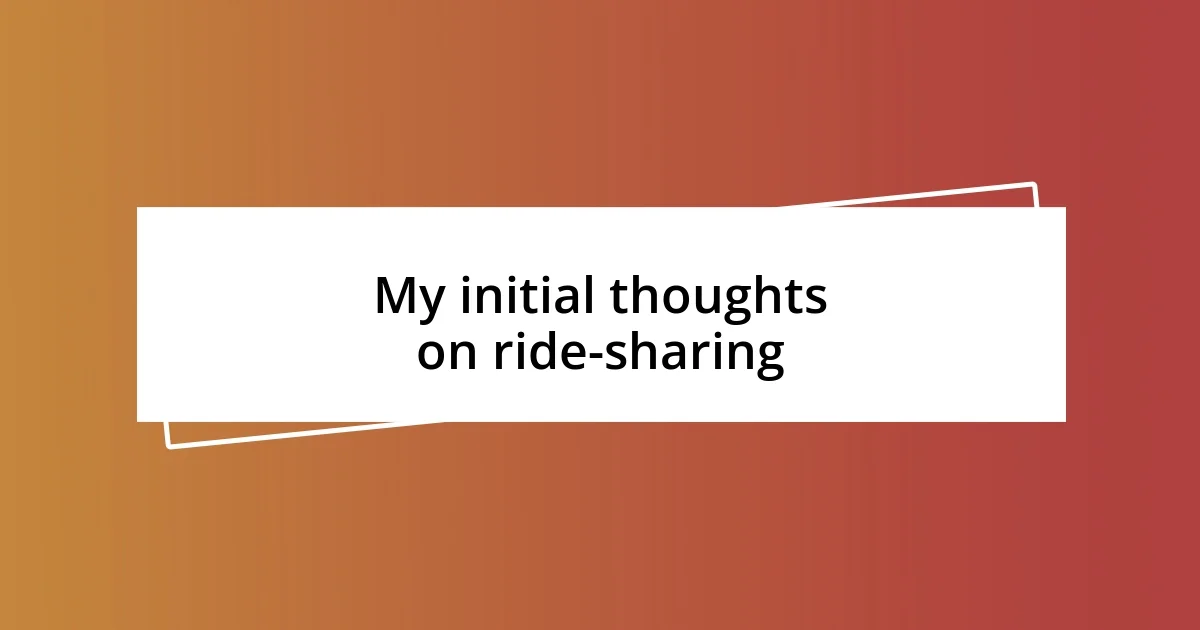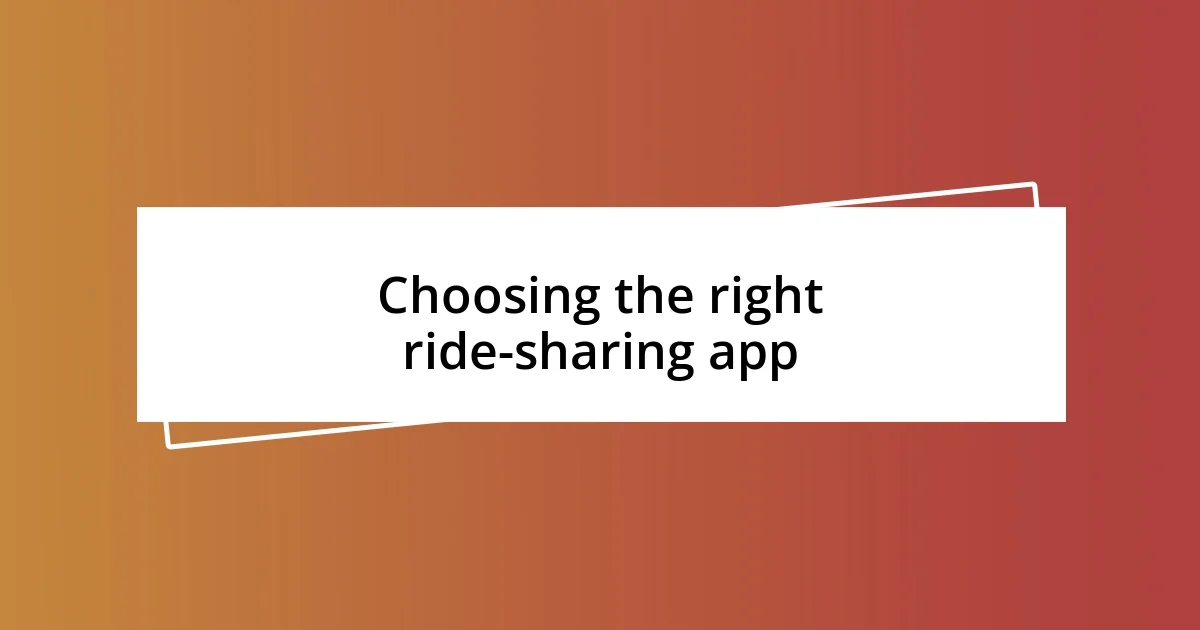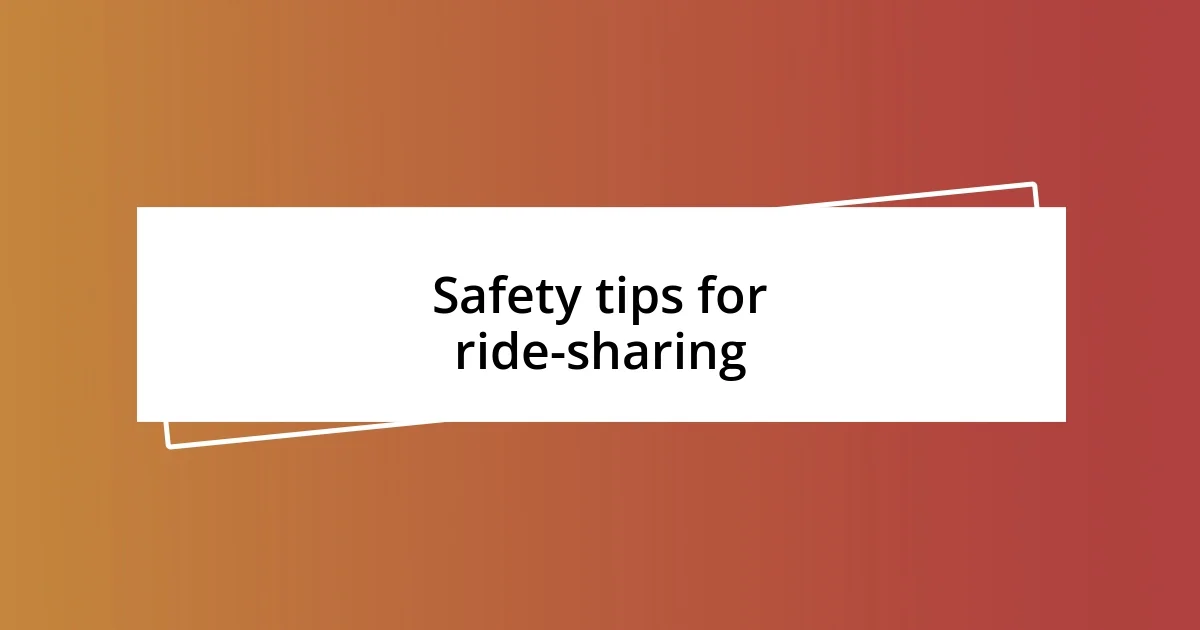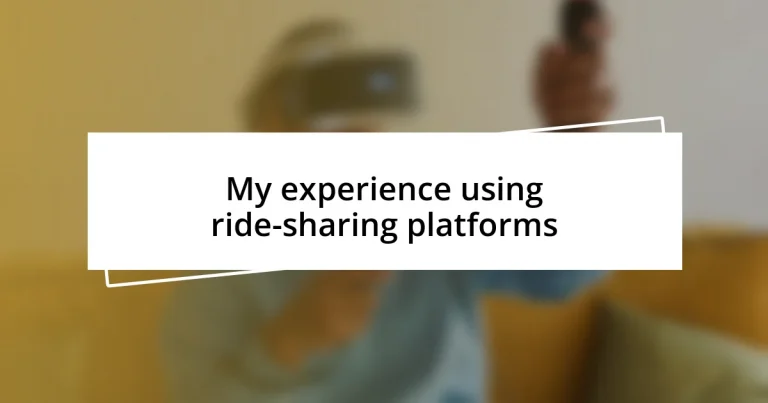Key takeaways:
- Initial skepticism about ride-sharing shifted to appreciation for convenience, social interaction, and sustainability.
- Selecting the right ride-sharing app is crucial, considering factors like pricing, user ratings, safety features, and ride options.
- Valuable lessons include clear communication with drivers, managing expectations for ride times, and the importance of leaving feedback to improve services.

My initial thoughts on ride-sharing
When I first heard about ride-sharing, my initial reaction was a mix of excitement and skepticism. How could getting into a stranger’s car possibly be safe or comfortable? Yet, the convenience it promised was undeniably appealing. I remember the first time I used a ride-sharing app after a late night out. The ability to summon a ride with just a few taps on my phone felt revolutionary, almost like stepping into the future.
As I climbed into the backseat, my curiosity outweighed my apprehension. The driver was friendly, and there was something comforting about the fact that they had been rated and reviewed by other users. It made me wonder: is this modern technology redefining the way we connect with our community? Over time, those initial hesitations melted away, and I began to appreciate the spontaneity and social interactions that ride-sharing opened up for me.
Another aspect that struck me was the environmental angle. Thinking about carpooling with others highlighted a sense of shared responsibility for the planet. I often found myself pondering how many fewer cars would be on the road if more people utilized these services. This made me feel part of something bigger, sharing not just rides but a commitment to sustainability. Each ride became not just a trip but a small step toward a more connected and responsible world.

Choosing the right ride-sharing app
Choosing the right ride-sharing app can definitely shape your experience significantly. I remember my first time comparing options on a dark rainy evening. I wanted not only a safe ride but also a quick and affordable one. After peeking into different apps, I discovered that pricing varied greatly, and I learned that some platforms even had promotions on certain days. It was like striking the right balance between convenience, cost, and comfort.
I also realized that user ratings are critical in this decision. For instance, I often check comments about drivers’ friendliness and punctuality. On one occasion, I chose a ride from an app known for its premium service. The driver was not just timely; they shared insightful tips about the city that made my trip enjoyable and memorable. So, taking the time to choose an app that suits your needs can lead to experiences that stick.
In terms of features, it’s essential to consider what each app offers. For example, some provide options for carpooling, while others include in-app safety features, like a shareable ride status. I once used a ride-sharing app that allowed me to share my trip details with a friend for peace of mind, and that added layer of security made me feel so much better when traveling at night.
| Feature | App A | App B | App C |
|---|---|---|---|
| Pricing | Competitive | Premium | Affordable |
| Ride Types | Standard, Luxury | Luxury Only | Standard, Carpool |
| User Ratings | 5 Stars | 4.5 Stars | 4 Stars |
| Safety Features | Share Status | In-App Emergency | Standard |

Understanding pricing and fees
Understanding the pricing and fees involved in ride-sharing can be quite a journey in itself. I remember the first time I was shocked by surge pricing, especially when I needed a ride after a concert. The app displayed a price drastically higher than usual, and I hesitated, wondering if getting home safely was worth it. This experience taught me that understanding these fees is crucial, as they can vary significantly based on time, demand, and location.
Here’s a breakdown of some common fees I’ve come across while using various ride-sharing platforms:
- Base Fare: This is the initial charge to get the ride started.
- Time and Distance Rate: Additional charges based on how long and how far the ride is.
- Surge Pricing: Higher rates during peak demand, like weekends or special events.
- Cancellation Fee: A fee if you cancel a ride after a certain time limit.
- Booking Fee: A flat fee added to cover the cost of operating the service.
One time, I was shocked to see a cancellation fee applied after I decided not to take a ride due to the driver’s late arrival. This added an unexpected layer of frustration. I quickly learned to read the app’s policies carefully, as these small details can impact your overall budget for using these services. Being informed helped me make smarter decisions when scheduling rides.

Safety tips for ride-sharing
Staying aware of your surroundings is crucial when using ride-sharing services. I’ll never forget the time I got into a car that didn’t feel right—the driver’s demeanor was off. I had glanced at my phone quickly as I approached the car, but I should have taken a moment to confirm the license plate and the driver’s appearance. I learned that confirming these details can prevent uncomfortable or even dangerous situations. Always trust your gut: if something feels off, don’t hesitate to cancel the ride.
Using the in-app safety features can provide an extra layer of reassurance. There was a night when I had to travel home late, and I opted to share my ride details with a friend. Knowing my friend could track my location put my mind at ease and made me feel more secure during the ride. Engaging safety options like this can be a game changer, so I encourage you to familiarize yourself with these features beforehand. Isn’t it comforting to know that someone has your back, even when you’re out on your own?
Lastly, I always make it a point to sit in the backseat of the car—not just for comfort but for safety as well. On one occasion, I was reminded of this tip when I took a ride with a driver who was overly chatty. Sitting behind the driver gave me more space and allowed me to have a quick exit if necessary. This little maneuver can improve your comfort level and, in some cases, enhance your safety. Have you ever thought about how a simple choice like this could change your experience? It certainly did for me.

Dealing with common issues
One common issue I’ve encountered while using ride-sharing platforms is driver communication. There have been times when I was waiting for a ride, only to find myself puzzled by unclear instructions from the driver. I remember once, during a bustling festival, the app showed that my driver arrived but I couldn’t spot them. I called to ask for their exact location, and their response was vague. This taught me that clear communication from both sides is essential to avoid unnecessary frustration.
Occasionally, I’ve faced situations where my ride took longer than anticipated, often due to poor traffic management or the driver taking a roundabout route. Once, my driver decided to take a detour because they didn’t want to navigate through a congested area. While I appreciated the intention, it pushed my overall fare higher. Now, I usually check the route suggested in the app and share any preferred paths with the driver upfront, making the experience smoother for both of us.
Rider etiquette is another issue I’ve noticed. I recall a ride where my driver seemed distracted by a chatty friend in the passenger seat. It caught my attention and made me uncomfortable, as I felt the driver wasn’t fully focused on the road. This experience underscored the importance of maintaining a respectful atmosphere in the vehicle. Have you ever felt uneasy because of behaviors that disrupted your ride? I certainly have, and it’s a good reminder for everyone to be mindful of how our actions affect others in the shared space.

Lessons learned from my experiences
Navigating through ride-sharing has taught me many valuable lessons. I remember a time when my driver accidentally took me to the wrong destination because I didn’t provide clear details. It dawned on me that taking a moment to give precise instructions can save both time and stress. Have you ever experienced a mix-up simply due to a miscommunication? I definitely learned to be clearer about my destination moving forward.
Another lesson that sticks with me involves managing expectations. There was an instance when I was in a hurry, and the estimated arrival time kept stretching longer and longer. Frustration was creeping in, but then I took a step back and realized that traffic can be unpredictable. Now, I always allow extra time for my rides to accommodate any unexpected delays. Isn’t it interesting how adjusting our expectations can significantly affect our mood during a trip?
A notable personal takeaway revolves around being proactive about giving feedback. After a less-than-stellar ride, I once hesitated to leave a review, thinking, “What could my feedback really change?” However, I learned that sharing my experience helps improve the system. Those ratings and comments contribute to the community and can lead to better service for everyone. Isn’t it empowering to know that we can play a part in shaping the ride-sharing experience for others? Each lesson has added layers of understanding to my journey, making me a more informed and responsible rider.














